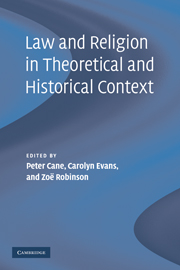Book contents
- Frontmatter
- Contents
- List of Contributors
- 1 Introduction
- 2 The moral economy of religious freedom
- 3 Understanding the religion in freedom of religion
- 4 Why religion belongs in the private sphere, not the public square
- 5 Pluralism in law and religion
- 6 The influence of cultural conflict on the jurisprudence of the religion clauses of the First Amendment
- 7 From Dayton to Dover: the legacy of the Scopes Trial
- 8 A very English affair: establishment and human rights in an organic constitution
- 9 Days of rest in multicultural societies: private, public, separate?
- 10 Australian legal procedures and the protection of secret Aboriginal spiritual beliefs: a fundamental conflict
- 11 Secular and religious conscientious exemptions: between tolerance and equality
- 12 Law's sacred and secular subjects
- 13 Freedom of religion and the European Convention on Human Rights: approaches, trends and tensions
- Index
- References
3 - Understanding the religion in freedom of religion
Published online by Cambridge University Press: 07 July 2009
- Frontmatter
- Contents
- List of Contributors
- 1 Introduction
- 2 The moral economy of religious freedom
- 3 Understanding the religion in freedom of religion
- 4 Why religion belongs in the private sphere, not the public square
- 5 Pluralism in law and religion
- 6 The influence of cultural conflict on the jurisprudence of the religion clauses of the First Amendment
- 7 From Dayton to Dover: the legacy of the Scopes Trial
- 8 A very English affair: establishment and human rights in an organic constitution
- 9 Days of rest in multicultural societies: private, public, separate?
- 10 Australian legal procedures and the protection of secret Aboriginal spiritual beliefs: a fundamental conflict
- 11 Secular and religious conscientious exemptions: between tolerance and equality
- 12 Law's sacred and secular subjects
- 13 Freedom of religion and the European Convention on Human Rights: approaches, trends and tensions
- Index
- References
Summary
Introduction
In our pursuit of an inclusive, egalitarian, individual-rights-respecting polity, we are often tempted to interpret freedom of religion as though it were designed to place religious belief on a par with other beliefs – as though it were designed to secure an absolute equality in religious matters (equality, that is, between religion and non-religion, as well as among different religious beliefs). This view is the centrepiece of an important new book by Christopher Eisgruber and Larry Sager, which Sager defends ably in his contribution to this volume. Indeed, Eisgruber and Sager do more than simply assume that religious and non-religious beliefs must be treated the same: they argue that a commitment to equality and liberty alone is sufficient to generate the entire content of freedom of religion, without attaching any value to the distinctive nature of religious belief.
This, I will argue, is a mistake. My essential claim is that one cannot make sense of freedom of religion – at least if it has something like the scope that the great majority of commentators, including Eisgruber and Sager, ascribe to it – unless one recognises that the freedom is founded upon the affirmative valuing of religion. Any coherent conception of the freedom depends upon the premise that religious belief has special value and deserves special protection.
- Type
- Chapter
- Information
- Law and Religion in Theoretical and Historical Context , pp. 26 - 43Publisher: Cambridge University PressPrint publication year: 2008



